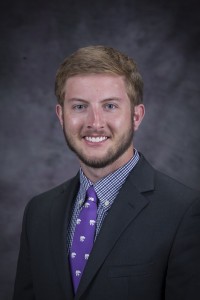
“We couldn’t be more excited that our state is just one final step away from having Lifeline 911 passed into law. When it comes to student safety, situations of life and death should always be considered with utmost responsibility.We feel passionately that this legislation can keep one student’s dangerous decision from resulting in the ultimate consequence, as this law will give students the confidence to make the call in alcohol-related medical emergencies. We feel this is not only an important achievement on behalf of student safety, but also a tremendous testament to the role that student governments in the state of Kansas can play in advocating for student interests at all levels of government.”
Andy Hurtig
Student Body President
Senior, Accounting & Finance
Wichita, KS
The Kansas Board of Regents Students’ Advisory Committee and their constituent student governments recommend creating a Lifeline 911 law.
- Lifeline 911, also known as Medical Amnesty and 911 Good Samaritan in some states, is a statewide law that grants limited legal immunity to intoxicated minors who seek medical attention for himself, herself, or another individual.
- Alcohol related unintentional injuries are a leading cause of death for young people in the United States. A medical amnesty law could reduce the number of deaths among youths, especially in college towns.
- Teens should not be forced to pay the ultimate price when they choose to drink underage.
Background:
- Lifeline 911, also known as Medical Amnesty and 911 Good Samaritan in some states, is a statewide law that grants a limited legal immunity to intoxicated minors who seek medical attention for himself, herself, or another individual.
- 31 States and the District of Columbia have a Lifeline 911 Law of some sort. Those states include: CA, OR, WA, NV, UT, MT, CO, ND, NE, MN, OK, TX, HI, MI, IL, AR, LA, IN, KY, AL, GE, NC, VA, WV, MD, DE, PA, NJ, NY, NH, and ME. (10 of these have been passed within the last year.)
- Although the wording and specific requirements of each state’s bill differs slightly, the intent is to grant limited immunity from a state’s Minor in Possession (MIP) or Minor in Consumption (MIC) of alcohol charge in certain circumstances if they contact officials during a medical emergency.
- Currently there are over 200 colleges and universities that provide a type of guaranteed Medical Amnesty protection to their students on campus. Typically, intoxicated students are given amnesty from the school’s judicial system if they call 911 or make contact with officials in cases of medical emergency. However, this is not enough to serve all young people that go to college, because a vast majority live off campus.
History in Kansas:
- The bill, SB133, was passed 34 – 5 in the Kansas Senate in March 2015. (The House counterpart bill, HB2198, was pass favorably out of the House Judiciary committee in 2015 as well.)
- SB133 is currently in the House Judiciary committee.
- The bill was vetted and supported by several key interest groups: Kansas Association of Chiefs of Police, Kansas Sheriffs Association and Kansas EMS Association
Impact:
- Gives young people the confidence to pick up the phone and call 911 to look out for the safety of their friends, colleagues, and acquaintances. A simple phone call could save students from alcohol related tragedies.
- Alcohol related, unintentional injuries, are a leading cause of death for young people in the United States
Conclusions:
- Many people see a medical amnesty law as a policy to encourage underage binge drinking. Underage drinking is an epidemic in the nation and we are simply trying to look out for the health and safety of young people.
Source: KBOR Students’ Advisory Committee. “Legislator Packet, Higher Education Day.” 3 Feb. 2016.